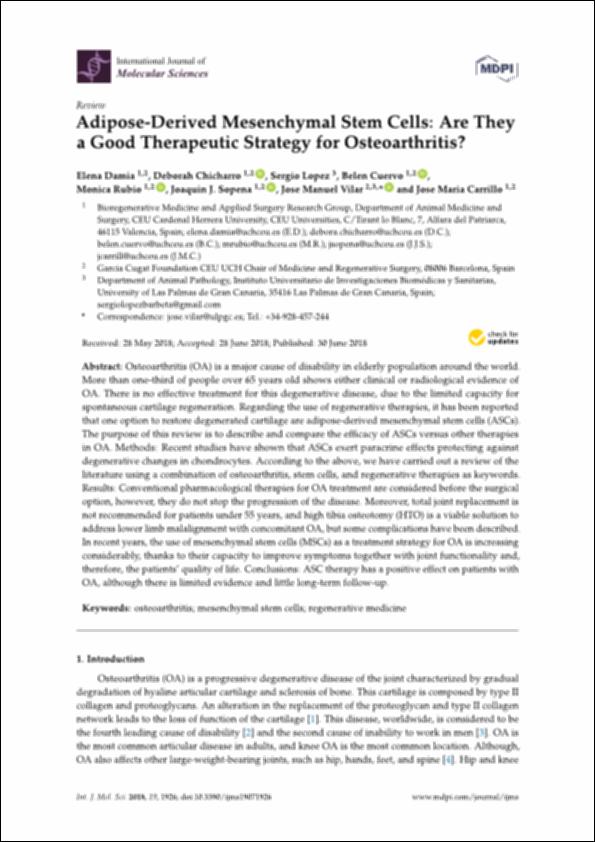Por favor, use este identificador para citar o enlazar este ítem:
http://hdl.handle.net/10637/9991Adipose-derived mesenchymal stem cells : are they a good therapeutic strategy for osteoarthritis?
| Título : | Adipose-derived mesenchymal stem cells : are they a good therapeutic strategy for osteoarthritis? |
| Autor : | Damiá Giménez, Elena Chicharro Alcántara, Deborah López Barbeta, Sergio Cuervo Serrato, Belén Rubio Zaragoza, Mónica. Sopena Juncosa, Joaquín Jesús. Vilar, José M. Carrillo Poveda, José María. |
| Materias: | Células madre - Uso terapéutico.; Osteoarthritis - Treatment.; Stem cells - Therapeutic use.; Growth factors - Therapeutic use.; Blood plasma - Therapeutic use.; Crecimiento - Factores - Uso terapéutico.; Plasma sanguíneo - Uso terapéutico.; Osteoartritis - Tratamiento. |
| Editorial : | MDPI. |
| Citación : | Damiá, E., Chicharro, D., López, S., Cuervo, B., Rubio, M., Sopena, JJ., Vilar, JM. and Carrillo, JM. (2018). Adipose-derived mesenchymal stem cells : are they a good therapeutic strategy for osteoarthritis?. International Journal of Molecular Sciences, vol. 19, n. 7, art. 1926. DOI: https://doi.org/10.3390/ijms19071926 |
| Resumen : | Osteoarthritis (OA) is a major cause of disability in elderly population around the world. More than one-third of people over 65 years old shows either clinical or radiological evidence of OA. There is no effective treatment for this degenerative disease, due to the limited capacity for spontaneous cartilage regeneration. Regarding the use of regenerative therapies, it has been reported that one option to restore degenerated cartilage are adipose-derived mesenchymal stem cells (ASCs). The purpose of this review is to describe and compare the efficacy of ASCs versus other therapies in OA. Methods: Recent studies have shown that ASCs exert paracrine effects protecting against degenerative changes in chondrocytes. According to the above, we have carried out a review of the literature using a combination of osteoarthritis, stem cells, and regenerative therapies as keywords. Results: Conventional pharmacological therapies for OA treatment are considered before the surgical option, however, they do not stop the progression of the disease. Moreover, total joint replacement is not recommended for patients under 55 years, and high tibia osteotomy (HTO) is a viable solution to address lower limb malalignment with concomitant OA, but some complications have been described. In recent years, the use of mesenchymal stem cells (MSCs) as a treatment strategy for OA is increasing considerably, thanks to their capacity to improve symptoms together with joint functionality and, therefore, the patients’ quality of life. Conclusions: ASC therapy has a positive effect on patients with OA, although there is limited evidence and little long-term follow-up. |
| Descripción : | Este artículo se encuentra disponible en la página web de la revista en la siguiente URL: https://www.mdpi.com/1422-0067/19/7/1926 |
| URI : | http://hdl.handle.net/10637/9991 |
| Derechos: | http://creativecommons.org/licenses/by/4.0/deed.es |
| ISSN : | 1422-0067. |
| Fecha de publicación : | 30-jun-2018 |
| Centro : | Universidad Cardenal Herrera-CEU |
| Aparece en las colecciones: | Dpto. Medicina y Cirugía Animal |
Los ítems de DSpace están protegidos por copyright, con todos los derechos reservados, a menos que se indique lo contrario.


